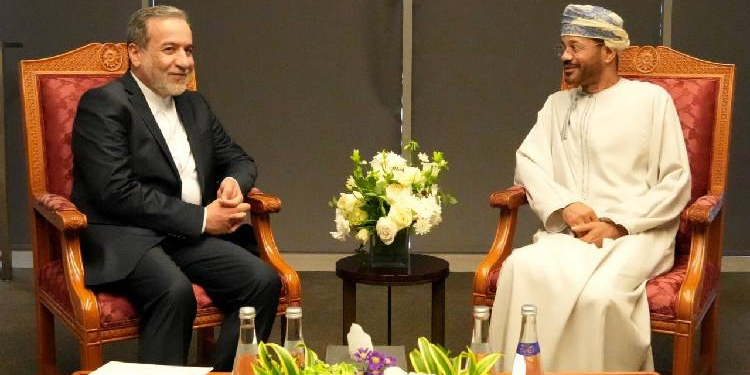TEHRAN, Apr 13 (NNN-IRNA) – Iranian Foreign Minister, Seyed Abbas Araghchi, yesterday, met with his Omani counterpart, Sayyid Badr bin Hamad bin Hamood Albusaidi, in the Omani capital of Muscat, ahead of “indirect” Iran-U.S. talks, the Iranian Foreign Ministry said in a statement.
The meeting took place shortly after Araghchi’s arrival, and before his scheduled “indirect” negotiations with U.S. Special Envoy to the Middle East, Steve Witkoff, over Iran’s nuclear programme and sanctions relief, the ministry said.
Araghchi hailed the “robust and longstanding” Iran-Oman relations in all areas, and thanked Oman for its “responsible” approach towards the issues and developments in the West Asia region, with hosting the “indirect” Iran-U.S. talks as proof, the ministry said.
Araghchi also briefed Albusaidi on Iran’s positions, so that he would convey them to the U.S. side, the ministry said.
Describing Iran-Oman ties as “excellent,” Albusaidi thanked Iran for choosing Muscat as the site for the “important” talks, and informed Araghchi of the arrangements and preparations made for the talks, read the statement.
U.S. President, Donald Trump, said last Monday, during a meeting with Israeli Prime Minister, Benjamin Netanyahu in Washington that, “direct talks” with Iran were expected.
On Tuesday, Araghchi confirmed that he would meet with Witkoff in Oman on Saturday for “indirect high-level talks.”
The discrepancy over whether the talks are direct or indirect, has persisted since early March, when Trump stated, he had sent a letter to Iranian leaders – via the United Arab Emirates – proposing direct negotiations on Iran’s nuclear programme.
While Iran later confirmed receiving the letter and left the door open for indirect engagement, it has rejected face-to-face negotiations, while under what it calls, Trump’s “maximum pressure” campaign, as Trump has repeatedly warned of severe consequences, if Iran does not abandon its nuclear programme.
On Wednesday, Trump warned that, military action remains on the table, if Iran fails to agree to end its nuclear programme. Meanwhile, the U.S. Treasury Department announced new sanctions targeting five entities, including the Atomic Energy Organisation of Iran and one individual in connection with Iran’s nuclear activities.
Iran signed a nuclear deal, formally known as the Joint Comprehensive Plan of Action, with six major countries – Britain, China, France, Germany, Russia, and the United States – in July, 2015, accepting restrictions on its nuclear programme in return for sanctions relief.
However, the United States withdrew from the deal in May, 2018, and reinstated sanctions, prompting Iran to scale back some of its nuclear commitments. Efforts to revive the nuclear deal have not achieved substantial progress.– NNN-IRNA






